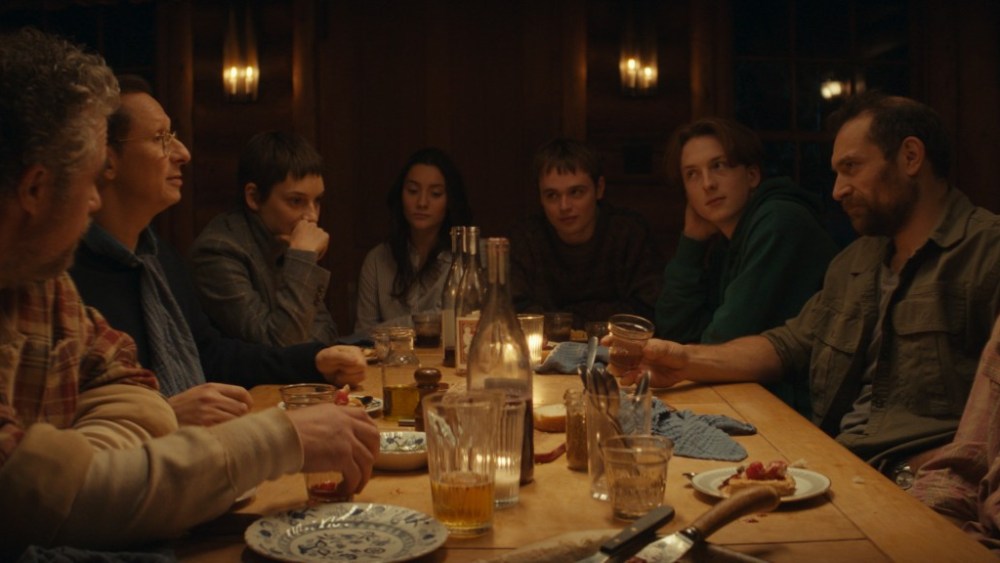A Beautiful But Fraught Rustic Getaway
As a general movie rule, when a group of happy weekenders head to a woodland cottage for a bit of rest and relaxation, the great outdoors has some grisly surprises in store for them. In “Who By Fire,” however, the horrors all come from inside the house — or more specifically from the people themselves, many of whose worst impulses and insecurities are unleashed by their tranquil surroundings. Dramatizing a curious case of cabin fever with keen human observation and patient wrangling of intangible dread, the third narrative feature from Quebecois director Philippe Lesage underlines his ability to carve a semblance of a horror movie from everyday domestic drama — confirming him as a filmmaker of considerable grace and daring.
It’s been six years since Lesage’s last film, “Genesis” — a long wait for his admirers, a select club still largely confined to the festival circuit, notwithstanding the polish and rigor of the director’s work. Despite his gifts, international distributors have yet to embrace Lesage in a big way, while even festival programmers have been circumspect: At this year’s Berlinale, “Who By Fire” premiered in the festival’s lower-profile, youth-oriented Generation 14plus strand, an odd fit for an imposing art film not especially geared toward young audiences, though it did deservedly win the top jury prize there. That might encourage more programmers and buyers to take a chance on Lesage’s latest, if they can get past its hefty but justified 160-minute runtime.
Where “Genesis” served as an indirect sequel to Lesage’s haunting 2015 breakout “The Demons,” “Who By Fire” cut ties with that specific saga of childhood anxiety and desire, though not with many of its themes and shifting moods. Nor with its Generation X milieu, as Lesage once more sets his story at some cellphone-free point in what appears to be the early 1990s: An opening closeup of two teenagers’ hands, unoccupied by devices as one clutches a diary and the other restlessly smoothes his corduroys, stresses the point. In the back of a car, Jeff (Noah Parker) sits awkwardly between his best friend Max (Antoine Marchand-Gagnon) and Max’s precocious older sister Aliocha (Aurelia Arandi-Longpré), on whom Jeff nurses an ill-concealed crush. Accompanied by Max and Aliocha’s father, nebbishy screenwriter Albert (Paul Ahmrani), the three are headed to the remote, rustic home of Albert’s old pal and collaborator Blake (Arieh Worthalter), a once-celebrated filmmaker who has recently moved into documentaries, having left the mainstream along with city life.
For aspiring filmmaker Jeff, whose friendship with Max isn’t terribly demonstrative, it’s a trip nervously bristling with opportunity: to make his move on Aliocha, for one thing, and to make an impression on Blake. But Aliocha would rather hang with the adults — who also include veteran actor Hélène (Irène Jacob) and her partner Eddy (Laurent Lucas) — while the affectedly macho Blake isn’t impressed by anyone so much as himself. His reunion with Albert, now working largely in kids’ TV, seems largely an excuse to haughtily compare their achievements; Albert retaliates by listing the failings of Blake’s personal life, an estranged son among them.
The discord between the men escalates in ways both pettily prankish and more profoundly wounding, all while a more quiet rift between Jeff and Max widens. Lesage demonstrates an acute understanding of straight male friendship in all its bluffly disguised intimacy, and his film tensely hangs on the subtle shift from jocular passive aggression into outright hostility. First among equals in a perfectly pitched and balanced ensemble — marked once more by Lesage’s deft facility with young performers — Worthalter’s performance is at once mesmerizing and repulsive in its cocksure alpha energy. You can practically see Blake’s hot reserves of inner anger straining against his cool posing.
But there’s much happening here besides, from Aliocha’s own reckless, sometimes ill-advised gestures of sexual independence to the fate of an ailing dog, placing Blake’s loneliness and self-imposed social isolation in relief. In three separate scenes of dinner-table conversation, played out in precisely poised long takes, the film’s lines of conflict come queasily together. As the knives come out, DP Balthazar Lab gazes across variously flushed or nonplussed faces, lit by candlelight that becomes progressively less cozy with each passing minute. Even when they contrive to release the tension, things go too far: In one remarkable set piece, an actual needle-drop of The B-52s’ infectiously silly novelty record “Rock Lobster” cues a group dance-along that turns practically feral in its thrashing physicality.
When the cabin can no longer contain this clash of egos and hormones, the group must quite literally take it outside — cuing a third act of predatory mind games, elemental danger and unexpected loss in the wild that reveals new reaches to Lesage’s already expansively fraught script. Lab’s camera drinks in the saturated autumnal coppers and enveloping hunter greens of the forest, but the views here aren’t emptily panoramic: Any jeweled image of nature comes with a tacit threat of decay or death. Winter is coming, and so is adulthood, and so is old age. By the end of this beautiful, unusual coming-of-age story, the line between adults and children hardly seems to exist, as all its principals regard each other with equal uncertainty, wondering what might become of them.

